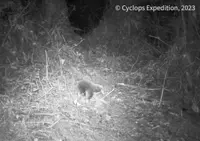An echidna walking amid vegetation in the Cyclops Mountains of Papua, Indonesia in this image taken on July 22 by the trail cameras of an Oxford University expedition. – Handout/Reuters
LONDON: Scientists have rediscovered a long-lost species of mammal – described as having the spines of a hedgehog, the snout of an anteater and the feet of a mole – in Indonesia's Cyclops Mountains, more than 60 years after it was last recorded.
Attenborough's long-beaked echidna, named after British naturalist David Attenborough, was photographed for the first time by a trail camera on the last day of a four-week expedition led by Oxford University scientists.
Having descended from the mountains at the end of the trip, biologist James Kempton found the images of the small creature walking through the forest undergrowth on the last memory card retrieved from more than 80 remote cameras.
"There was a great sense of euphoria, and also relief having spent so long in the field with no reward until the very final day," he said, describing the moment he first saw the footage with collaborators from Indonesian conservation group Yappenda.
"I shouted out to my colleagues that were still remaining... and said 'we found it, we found it'. I ran in from my desk to the living room and hugged the guys."
Echidnas share their name with a half-woman, half-serpent creature from Greek mythology, and were described by the team as shy, nocturnal burrow-dwellers that are notoriously difficult to find.
"The reason it appears so unlike other mammals is because it is a member of the monotremes – an egg-laying group that separated from the rest of the mammal tree-of-life about 200 million years ago," Kempton said.
The species has only been scientifically recorded once before, by a Dutch botanist in 1961. A different echidna species is found throughout Australia and lowland New Guinea.
Kempton's team survived an earthquake, malaria and even a leech attached to an eyeball during the trip.
They worked with the local village Yongsu Sapari to navigate and explore the remote terrain of north-eastern Papua.
The echidna is embedded in the local culture, including a tradition that states conflicts are resolved by sending one party to a disagreement into the forest to search for the mammal and another to the ocean to find a marlin, according to Yongsu Sapari elders cited by the university.
Both creatures were seen as so difficult to find that it would often take decades or a generation to locate them, but, once found, the animals symbolised the end of the conflict and a return to harmonious relationships. (Reporting by William James; Editing by Alex Richardson) – Reuters





